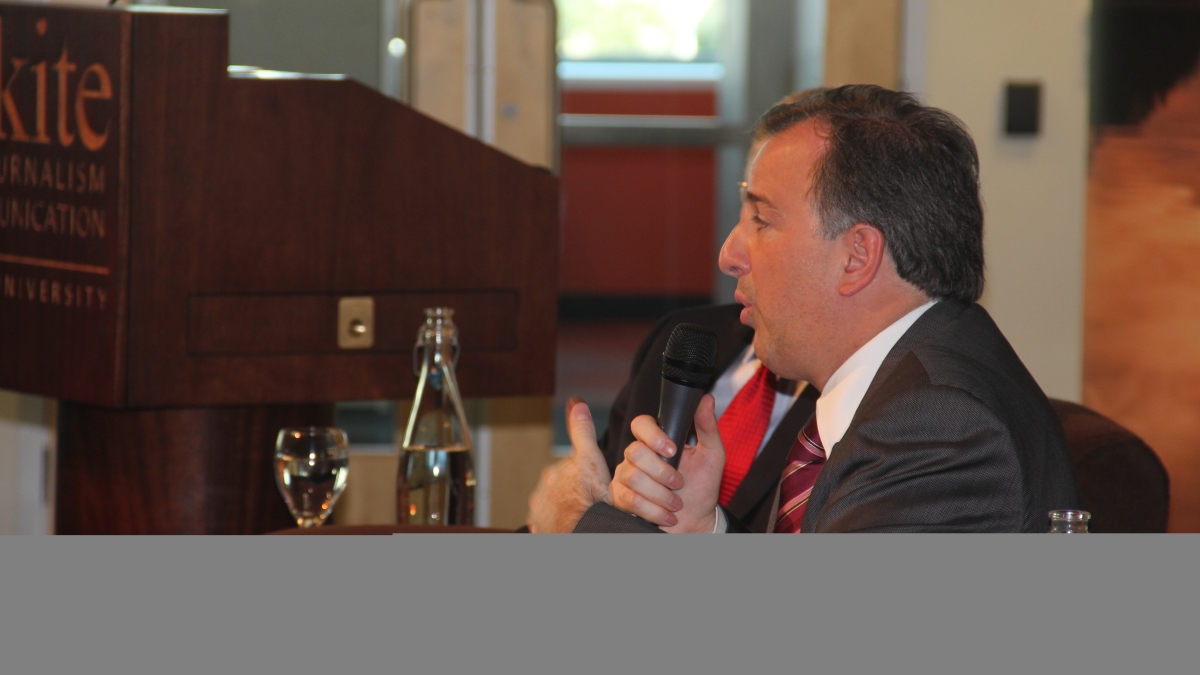ASU forum prompts US, Mexico to strengthen economic ties

The United States and Mexico historically have a strong economic and trade relationship, but there’s still plenty of room for improvement ... and growth.
That was the sentiment of an esteemed international panel assembled by Arizona State University’s McCain Institute and the Center for American Progress, which co-hosted "Growing Together: Mexico and the United States." The event took place on Sept. 12 in the First Amendment Forum at the Walter Cronkite School of Journalism and Mass Communication, 555 N. Central Ave., Phoenix.
While much attention has been paid by the media to U.S.-Mexico border issues, illegal immigration, drug trafficking and violent crime, often overlooked is the burgeoning economic relationship between the two countries that is driving growth, job creation and human development on both sides of the border.
“National security and immigration should be on everyone’s minds, but we should also talk about our economy and how America’s neighbor to the south is dynamic and competitive,” said Jose Antonio Meade Kuribreña, who serves as the Secretary of Foreign Affairs of Mexico.
Meade said Mexico is undergoing massive change and is thriving. He said recent policies have helped Mexican President Enrique Peña Nieto place the country in an economic turnaround. As a result, Mexico has a large middle class, a better educated workforce and is an important trade partner in today’s global economy.
According to the Bureau of Western Hemisphere Affairs, Mexico is the United States’ second-largest export market behind Canada. In 2013 two-way trade in goods and services was more than $550 billion, and nearly 80 percent of Mexico’s exports went to the United States. The U.S. and Mexico, along with Canada, are partners in the North American Free Trade Agreement, and cooperate on hemispheric and global challenges as well as transborder issues.
That three-way relationship, said panelist Robert B. Zoellick, chairman of Goldman Sachs’ International Advisors, is the key to future economic prosperity.
“Unfortunately, most people look at Mexico as an afterthought,” Zoellick said. “If Mexico, America and Canada can synchronize a stronger coordinated effort, we’ll be looked upon globally as a starting point, and not an afterthought.”
Zoellick added the challenges of the three countries are mainly cultural differences, human capital development and cooperation among policymakers. However, he sees a bright future if the relationship continues to flourish.
“It is stunning the relationship that has taken place in my lifetime,” Zoellick said. “Mexico is becoming a global player but there’s still more work to be done.”
Daniel Restrepo, a senior fellow at American Progress, said there are many moving parts to the relationship among the U.S., Mexico and Canada, but we’re not quite there yet.
“I do blame the media for the public perception of this relationship because it’s more intense and intimate than what you see in the headlines,” Restrepo said. “There are challenges bureaucratically. Cooperation seems evident but there’s still political dysfunction. Unfortunately, this holds back the U.S. and Mexico.”
Meade answered there’s nothing that can’t be overcome, and that Mexico is open for business.
“Mexico has shown that we have one of the most open economies in the world, and we’re willing to engage with the world,” Meade said. “The most important work we have to do is with North America.”
The Center for American Progress will continue to keep the dialogue open with three planned forums to be held in Mexico City, Tijuana and Washington, D.C., in October and November.